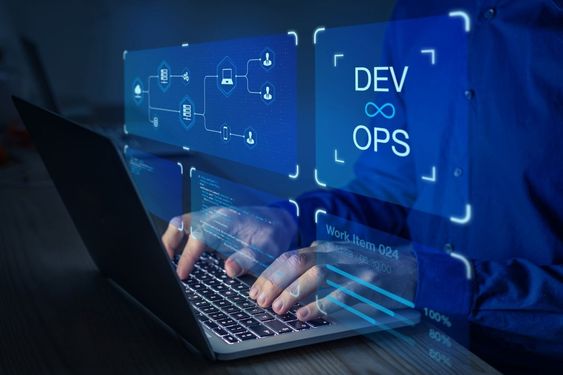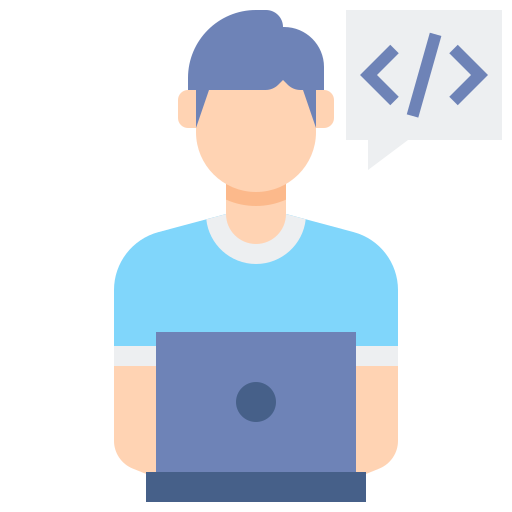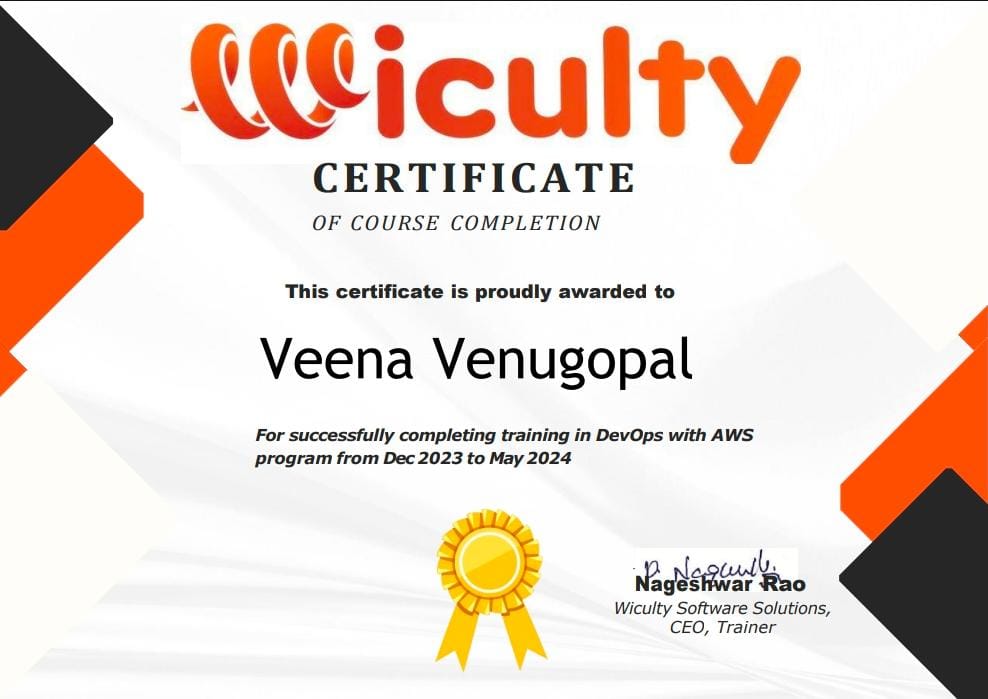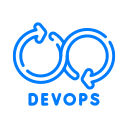AWS DevOps Certification Training Course
(Powered with Real-time Projects, Interview Prep & Trending DevSecOps)
(2,812)
Free Linux & Shell Scripting Course
Live Online Class
Classroom Training
17
Years Experienced
Trainer
10,000+
Happy
Learners
6000+
Placements
11
Years Of Industry Experience
100+
Hrs Comprehensive
Training
3
Real - time
Projects
AWS DevOps Certification Training Course Overview

Wiculty’s AWS DevOps training course is a job-oriented, 100+ hour comprehensive program designed to help you master modern AWS Cloud and DevOps skills
This AWS Certified DevOps Engineer course includes trending DevSecOps skills
You will work on 3 DevOps real-time projects, gaining practical industry experience
Wiculty’s AWS DevOps Course curriculum is designed to equip you to crack any AWS DevOps interview and work on Real-time DevOps projects from day one
Upon completion of AWS DevOps job-oriented training course, we assist you with resume preparation, mock interviews, AWS DevOps job placements, and post devops job support
Prepares you for the “AWS Certified DevOps Engineer - Professional” (DOP-C01) Exam

AWS DevOps Training Course Key Highlights
Corporate Training
Upcoming AWS DevOps Training Batches
AWS DevOps Online and Classroom Training
100+ hours of instructor-led training
3 Months Course Duration
Live Online & Classroom Training
Weekday & Weekend Batches
Refund option even after 10 classes
21st March
FRIDAY
07:00PM TO 08:00PM
IST(GMT+5:30)
22nd March
SATURDAY
08:00PM TO 09:00PM
IST(GMT+5:30)
24th March
MONDAY
07:00PM TO 08:00PM
IST(GMT+5:30)
₹30,000 | $445 USD
(all inclusive)
EMI starts at ₹5000 / Month
(No cost EMI option available)

Secure Transaction
AWS DevOps Self-paced Training Course
Instant access to full AWS DevOps Course Recordings – Learn at your own pace, from anywhere, anytime
No fixed class schedule – Study whenever it suits you with our AWS DevOps Self-paced Course
Perfect for shift workers – Or ideal if you can't commit to a fixed class time
Personalized trainer support – Get help with your doubts whenever you need it
₹30,000 | $445 USD
(all inclusive)
EMI starts at ₹5000 / Month
(No cost EMI option available)

Secure Transaction
Money-Back Guarantee – Enroll Risk-Free!
(Not Satisfied? Get a Full Refund Before 10 Classes)
AWS DevOps Trainer Profile

Nageswara Rao P
Founder & CEO
- Our best AWS DevOps trainer, Nageswara Rao P, is a seasoned professional with 17+ years of experience as a DevOps Architect, Consultant, and Corporate Trainer
- 11 years of experience as a trainer at Wiculty: Can simplify complex concepts simple with real-world anologies
- Former WalmartLabs employee: Brings practical industry experience to training sessions
- Passionate trainer: Understands what is required for learners to crack the interview and work on AWS DevOps real-world projects
- Trained 10,000+ students through AWS DevOps online, classroom, and corporate training programs

AWS DevOps Skills | Course Tools Covered
Linux
Shell Scripting
Git
Maven
Jenkins
Docker
Kubernetes
Ansible
Terraform
DevSecOps
Grafana
Prometheus
EC2
VPC
EBS
S3
IAM
LoadBalancer
Auto Scaling
Cloud Formation
Elastic Beanstack
Lambda
Code Build
Code Deploy
Code Pipeline
AWS DevOps Projects Covered
GamutKart - E-commerce Platform (Similar to Flipkart)
In this DevOps hands-on project, you will build and deploy a fully functional e-commerce platform using AWS DevOps tools, CI/CD pipelines, Multiple test environments with Production setup, Load balancer and best practices. This AWS DevOps project simulates real-world e-commerce scenarios, helping you apply your AWS DevOps training skills in a practical setting
GuestBook - A Web-based Guestbook Application
In this project, you will build and deploy a GuestBook application that allows users to sign a virtual guestbook with their names and messages. This web application will demonstrate the core principles of AWS DevOps certification course, infrastructure automation, and containerization
Nginx Web Server Deployment & Configuration
In this hands-on project, you will deploy a static web application and configure an Nginx web server, demonstrating your AWS DevOps training skills through real-world infrastructure setup, continuous integration, and automated deployment processes
AWS DevOps Course Curriculum
Free Shell Scripting Course
Module 1DevOps – A Big Picture
- What is DevOps, Acronym What is Dev & Ops?
- Acronym: Dev + Ops – misconceptions.
- Gamut of Devops Tools overview
- End-to-End DevOps work-flow
- Roles and Responsibilities of DevOps Resource
- Who can learn DevOps?
- Pre-requisites for DevOps
- Importance of DevOps Practices in Software Development.
- DevOps in Realtime and it’s goals.
- SDLC models, Agile and DevOps
- History of DevOps
- Important terminology
- Opportunities, Trends and Future of DevOps
- Overview of: Version Control mechanism, Build and Deployment Process, Continuous Integration and Deployment, Configuration Management, Containerization, Virtualization, AWS Cloud platform, etc..
- Role of Cloud Platforms in DevOps
- DevOps and Cloud. Is Cloud + something is DevOps?
Module 2Git - Version control system
Chapter-1: Version Control Systems Overview
- Introduction to Version Control Systems (VCS)
- Different Version Control Systems in the market
- Evolution of VCS’s
- Role of VCS’s in Source code management
- Version Control System Goals
- Features of Version Control Systems
- Role of Version Control System in DevOps
- What is Git and why Git? Role of Git in DevOps
- Role and Responsibilities of DevOps Engineer in Git
- Role of Source code Versioning in release management
- Git Features. CVCS Vs DVCS
- Version Control Systems Principles
Chapter-2: Getting started with Git
- Git Basics
- Git Architecture
- Evolution of VCS’s
- Source code management with Git
- End-to-End Git Work-flow at 10k foot
- Git Vs SVN Vs other commercial VCS’s
- Git Command Line & GUI
- On-premise Vs Hosted Git Solutions
- Overview of GitHub, GitLab, Bitbucket , etc.
Chapter-3: Let’s make our hands Dirt with Git
- Git Installation, Uninstallation, Upgradation in Linux and Windows
- Git Command Line and GUI tools
- DevOps Engineers favourite – CLI Or GUI?
- Setting up Mandatory Configurations. Best practices.
- $ git config command to setup User, Email, Editor and Credentials
- Creating Remote repository – On-Premise & GitHub
- Creating Local repository
- End-to-End git work-flow execution with commands
Chapter-4: An attempt to Deep dive into Git concepts
- Git Jargons understanding your understanding based on what you have learned so far. Let’s bring you in track to hit the Iceburg!
- If you have to give a short lecture on Git in Gamut Gurus, how much you can talk?
- Understanding Git as a tool and it’s internals.
- Commit your first change to Remote repository, Consciously! $ Commands: ‘git add’, ‘git commit’, ‘git push’
- What is Source, Stage and Local repository.
- Git Revision Structure – SHA, User, Email, Commit Message and other metadata
- How Git generates SHA value? What is this checksum code and data integrity all about? Why such a long hexadecimal number?
- Significance of Staging Index. Then why git allows me to skip it. Skipping the staging.
Chapter-5: Advanced Git. Let’s be more technical!
- Git command line with most frequently used options in real-time$ git log
- $ git log
- – git log –author
- – git log –grep
- – git log –since
- – git log –until
- – git log –oneline
- – git log –grep , etc.
- $ git diff
- – git diff
- – git diff –staged
- – git diff sha..sha
- $ git rm
- – Is deletion permanent? Best practices.
- – Resurrect a deleted file
- $ git mv
- – Renaming a file
- – History carry forward after rename
- Listing the change efforts from repository
- – Is deletion permanent? Best practices.
- – Resurrect a deleted file
- – understand git show output
- Undoing the changes
- – Revert a change from Source Area
- – Revert a change from staging area
- – Revert a committed change
Chapter:6- Branching & Tagging –Release management with Git
- What is a branch & tag ?
- When and Why do we create a new branch and tag?
- Importance of master branch & stable code.
- Branching Strategies or Models – Pros and Cons
- Practical’s
- – List all branches
- – Creating a new branch and making it public
- – List all remote branches
- – Switching from one branch to another
- – Create and switch to newly created branch
- – Understanding HEAD and Git ‘s intelligence
- – List all tags
- – Creating tags and best practices
Chapter:7 – Merging and Rebase
- What is merge?
- Merging Best practices
- Merging Vs Rebase
- Fast-Forward Merge
- 3-way Merge algorithm
- Merging from one branch to another
- Conflict resolution best practices
- Branching best practices to minimize conflicts
- Practicals
- – Merging the code from one branch to another
- – Conflict markers, resolution
- – Identifying conflict owners
- – Test you merge before you commit
- – Reverse merging
Chapter:8 Remote Git
- Git pull
- Git push
- Git clone
- Git fetch
- Difference between pull and fetch
- Difference between clone and pull
- Pull and Fetch best practices
Module 3Maven - Build Tool
Chapter-1: Overview of build tools
- Build and Deployment End-to-End Workflow
- Roles and Responsibilities of DevOps Engineer in Software Build & Deployment
- Role of Build tools in Software build process automation
- Introduction to Maven build tool
- Maven Vs ANT(Key Features of Maven Over ANT)
- Build tools for different languages
- Feel the pain of source code manual compilation with manual example
- Necessity of transforming source code into binaires
- What is compilation
- Why source code compilation is required.
- Artifact, Binaries, Executables, object code definition – Get terminology
- Machine Vs Human understandable language
Chapter-2: Getting started with Maven
- Maven Installation and Prerequisites, Downloading Maven and JDK
- Setting up JAVA_HOME, M2_HOME and PATH ENV variables
- Discussion about $USER_HOME/.bashrc file and Installation of any tool in Linux
- Java build process. Packaging sequence (.Class, .Jar, .War, .Ear , etc.)
- TEST YOUR KNOWLEDGE BEFORE DEEP DIVE:
- – What is compilation & why we compile the source code
- – Packaging sequence for Java application
- – What is Build
- – What is Deployment
- – Environment
- – Dev, QA & DevOps teams Interaction and Collaboration
Chapter-3: How to collaborate well with DEV and QA teams
- Creating a project using Maven
- Maven’s convention over configuration feature
- Understanding Project source tree layout
- Understanding Junit unit testing framework
- Understanding Test Driven Development (TDD) approach
- Overview of Software development & other testing methodologies
- Software Development and Testing Best practices
Chapter-4: Hands-on with Maven
- Building your first project
- $ mvn install command & deep discussion about maven life cycle phases
- Understanding build output, test results, class files etc.
- Verifying built artefacts, naming convention and m2 local repository
- Dependency Management: What is code dependency-Maven’s automatic dependency resolution feature
- Direct and Transitive dependencies-Defining dependencies in pom file
- Maven binary repositories-Local, Private and Central repository
Chapter-5: Implementing various Build methodologies based on real-time requirements
- Build Types – hands-on
- – Complete build/Clean build/Full build
- – Nightly build
- – Daily build
- – bugfix build
- – adhoc/unplanned/emergency builds
- Execution of all build types with hands-on for GamutKart project
- Maven plugins, Skippng Test compilation, run and execution of tests when required
- – $ mvn install -DskipTests
- – $ mvn install -Dmaven.test.skip=true
- – $ mvn surefire:test
- Creating project for web application. Building the war file
Chapter-6: Deployments deep dive
- Understanding various Environment and their usage: DEV, QA, SIT, UAT, Perf, STAGE, PROD , etc.
- Deployment promotion methodologies from one environment to another environment
- Understanding application servers and web servers
- Tomcat installation & configuration
- Understanding Tomcat startup scripts, deployment path, port configurations etc.
- Building and deploying GamutKart project into tomcat
- Understanding WAR / EAR files and its resources
Chapter-7: Projects
- Project-1: Automate complete build and deployment process using Maven and Shell
- Project-2: Automate complete build and deployment for real-time gamutkart application.
- Deployment best practices & roll back process
- Launching application from different environments
- Understanding DEV, QA, OPS and DEVOPS teams interactions, SLA’s and Support
- Introduction to CI/CD process to reduce deployments turn-around time
Module 4Linux/Unix
Chapter 1: Learn Linux Admin Level?
- Learn package management & process monitoring
- Work on services, utilities, important files and directories
- Understanding SystemD functions and works
- Linux User Administration functions
- File System Management (Generic & LVM)
- Learn to manage Advanced File System Management (Software RAID)
- Control Server-Client Configurations (FTP / SFTP / HTTP) nodes
- Configuring Samba and SMTP
- Firewall & IP Tables and security checks
- Database Configuration (MySQL / Mariadb)
- Using Control Panels to Manage Linux Servers (Webmin)
Module 5Shell Scripting
Chapter 1: Introduction to Shell Scripting
- What is a shell?
- Importance of shell scripting
- Common shells: Bash, Zsh, Fish
- Basic syntax and structure of shell scripts
- Creating and running your first shell script
Chapter 2: Basic Shell Commands
- File operations: ls, cd, pwd, mkdir, rm
- Text processing: cat, grep, sed, awk
- System information: uname, top, ps
- File permissions: chmod, chown
- Pipelines and redirection
Chapter 3: Variables and Data Types
- Variable declaration and assignment
- Environment variables vs. local variables
- Data types: strings, integers, arrays
- Command substitution
- Arithmetic operations
Chapter 4: Control Structures
- If-else statements
- Case statements
- For loops
- While loops
- Until loops
- Break and continue statements
Chapter 5: Functions
- Function declaration syntax
- Passing arguments to functions
- Return values and exit status
- Local vs. global variables in functions
- Recursive functions
Chapter 6: Input/Output Operations
- Reading user input with read
- Command-line arguments
- Redirecting input/output
- Piping commands
- Here documents
Chapter 7: File Operations and Text Processing
- Reading from and writing to files
- Text processing with sed and awk
- File permissions and ownership
- Finding and manipulating files with find
- Archiving and compression
Chapter 8: Regular Expressions
- Basic regex patterns
- Using regex with grep and sed
- Extended regular expressions
- Regex in Bash scripting
- Practical regex example
Chapter 9: Debugging and Error Handling
- Using set -x for debugging
- Error handling with exit codes
- Trapping signals
- Logging and error reporting
- Debugging techniques and best practices
Chapter 10: Advanced Topics
- Subshells and command substitution
- Process management
- Networking scripts
- Interacting with databases
- Creating GUI scripts with dialog
Chapter 11: Best Practices and Security
- Code organization and commenting
- Security considerations in shell scripting
- Performance optimization techniques
- Version control for shell scripts
- Deploying and maintaining shell scripts
Module 6Jenkins – Continuous
Chapter-1: Jenkins concepts Overview
- Introduction to Agile Development
- Definition of continuous integration (CI), continuous delivery (CD), continuous deployment (CD)
- Difference between CI and CD
- End-to-End CI & CD Phases
Chapter-2: Getting started with Jenkins (Installation & Production Set-up)
- What is Jenkins and Why Jenkins
- Understanding continuous integration
- Introduction about Jenkins
- Jenkins Features
- Build Cycle
- Jenkins Architecture
- Production Installation and Configuration
- Tomcat and JDK installation. Setting up environment variables.
- Installing and configuring Jenkins using WAR and RPM
- Java installation and configuration
- Maven Installation
- Exploring Jenkins Dashboard.
Chapter-3: Let’s make our hands Dirt with Jenkins (Hands-on)
- Creating Jenkins job/project for builds integrating Git and Maven.
- Usage of different Job configuration options
- Different types of Jenkins Jobs
- Use cases for Freestyle, Pipeline, multi-configuration projects
- Configuring automated Build for WAR package creation
Chapter-4: Manage Jenkins
- Configuration of tools installations for Maven, JDK , etc.
- Jenkins global configurations and settings
- All options in Manage Jenkins
Chapter-5: Setting up Builds
- What are the different build types available in Jenkins?
- Build tools configuration in Manage Jenkins
- Jenkins job build steps, triggers, artefacts, and repositories?
- Setting up build steps and triggers
- Build tools configuration
- Running scripts as part of build steps
- Integrating source code management tools and polling VCS for to achieve C.I/C.D
- Develop automation for QA, SIT, UAT and PROD environment deployments.
- Write deployment scripts for different environments
Chapter-6: Jenkins Pipelines - Deep dive & advanced concepts
- What is pipeline?
- Advantages of build pipelines
- Creating pipeline projects using GUI
- When to use pipelines and different types of pipelines
- Manual/GUI pipeline Vs Jenkins’ file scripted pipeline
- Upstream/downstream jobs
- Writing Jenkins file using Groovy
- Groovy scripts and syntax
- Creating pipeline projects using Jenkins file and declarative Groovy DSL
Chapter-7: parameterized Jenkins jobs
- Creating Parameterized build jobs
- Passing parameters between jobs
- Identifying parameters and how to use them: file parameter, string parameter, choice parameter
- Deployments to QA, SIT, UAT, etc environments using a single Jenkins job
- Writing Shell script to deploy the application into multiple machines of any environment
Chapter-8: Jenkins CLI - Command line options
- Use cases and applying Jenkins CLI for real-time scenarios
- Explore Jenkins CLI options.
- Triggering build jobs from commandline
- Cleaning up builds runs using CLI
- Running Jenkins CLI based on user’s authorizations
Chapter 9: Jenkins Plugins
- Introduction to Plugins. What is a plugin?
- Plugins Installation, Un-installation and upgrade
- Different ways of plugin installation and management
- Most Frequently used plugins in real-time (10 – plugins usages)
- Finding suitable plugins and interpreting plugins documentation for real-time scenarios
Chapter-10: Jenkins Administration
- Changing Jenkins HOME directory
- Setting up System notifications for users
- Email configuration for sending CI/CD notifications
- Setting up different notifications for build, deployment, testing failures
- Jenkins backup mechanisms and restoration policies
- Installation of thin backup plugin and configuring the same for automatic backups
- Setting-up HA and Test server for Jenkins
- Jenkins upgradation
- Migration of Jenkins from one server to another
Chapter-11: Securing Jenkins
- Setting up Security for Jenkins
- Setting up authentication mechanism using LDAP and Jenkins own Database
- Setting up authorization policies using matrix-based security
- Authentication versus authorization
- Matrix based and Project based security
- Jenkins authorizations to Dev, QA and other stakeholders. Best Practices
- Creating Users and setting up authorization
Chapter-12: Distributed Builds
- What are distributed builds?
- When do we implement distributed builds?
- Setting master and slave concepts. Best practices
- Running builds in parallel
- Configuring slave nodes and adding to master
- Setting up and using SSH agents, cloud agents
- Monitoring nodes
- Load balancing and finetuning builds and deployments using master and slave
Chapter-13: Continuous testing
- Benefits of testing with Jenkins
- Define unit test, smoke test, user acceptance test, functional tests, etc
- Publishing test reports in Jenkins dashboard
- Integrating with test automation tools
- Integrating code coverage tools
- Importance of quality gates, TDD.
- Promoting code from one environment to another passing through quality criteria
Chapter-14: Triggers
- Different types of Jenkins job Triggers
- Real-time scenarios for different job triggers
- Setting up repository poling for Continuous Integration builds
- Crontab syntax for job scheduling
- Poll scm Vs Periodic builds
Module 7Docker – Containerization
Chapter-1: Introduction to Containerization & Docker
- What is containerization?
- What is Docker?
- Why Docker and Docker features, who can use it?
- Basics of Virtualization
- Difference between Virtual machine (VM), Physical machine and Docker container
- Virtual machine and Docker usage in real-time and DevOps world
Chapter-2: Docker Installation in Production
- Docker supported platforms
- Docker pre-requisites in production
- Pre-requisites check commands (OS, Kernel, Hardware, etc.)
- Docker Installation Steps
- Configuring Docker to be executed without sudo
- Installation check
- Docker clean uninstallation
Chapter-3: Getting started with Docker containers
- Creating first container & Linux concepts and features for containers
- Root file system, networking and processes isolation.
- Docker hardware and OS lightweight virtualization
- Docker image concepts. Shipping the product code with dependencies and pre-requisites
- Installation of frequently used Linux commands (ssh, net-tools, vim, )
- Difference between Docker Image and Container
- Inspecting the new container (hostname, IP, hosts file, processes, n/w capabilities)
- Root file system, networking and processes isolation.
- How Docker creates any flavour of container on top of any host Linux OS
- Creating Linux containers on Windows. Concepts involved
- SSH setup in containers
Chapter-4: Container management commands
- Shutdown Docker container
- Listing all containers in host
- Listing only running containers
- Listing last few number of containers
- Inspecting Docker container information
- Listing last created container
- Creating a container with our own name
- Renaming a container
- Deleting one, all, stopped and running containers
- Starting, stopping and restarting containers from host
- Attaching to a running container
- Keyboard shortcuts
- Inspecting container processes from host
- Stopping the container gracefully and forcibly
- Find more about a container. Understand container inspect JSON format and querying specific attributes
- Creating and pushing a running container in daemon mode
- Creating demonized containers
- Pushing container in sleep mode
Chapter-5: Docker images. Deep dive!
- Understand more about Docker images
- Advantages of Docker images in application deployments
- Docker Image necessities
- Solving ‘Works in my machine problem’ with Docker implementation
- Restoring environments with Docker images
- Auto scaling environments using Images
- Setting up dev environments with images. Docker Advantage!
- Implementing Self-service deployment models. Cutting down DevOps team’s support.
- Docker image storage in host machine
Chapter-6: Creating custom Docker Images. Shipping Applications with all pre-requisites.
- Docker Image creation techniques / approaches
- Writing Docker file for image creation
- Docker file instructions and usage
- Setting up Nginx for web application
- Project: 1 – creating custom Docker image for Nginx web application
- Project: 2 – Creating custom Docker image for Gamut kart e-commerce web application
Chapter-7: Docker Repository. Storing images in Docker Hub
- Creating and setting up account in Dockerhub
- Docker registries & repositories
- Most frequently used and helpful images walk-through
- Documenting your custom image in Dockerhub
- Pulling and Uploading Docker images form/to Docker Hub
Chapter-8: Jenkins CI/CD Pipelines with Docker. Containerizing your applications
- Creating disposable environments using Docker images
- Integrating Docker with Jenkins
- Writing deployment scripts for provisioning environments with images
- Scaling up environments instantly with Docker images. Writing scripts
Chapter-9: Projects
- Project-1: – Shipping & Deploying web application using Docker Images
- Create Docker image with Web application code, Nginx and other pre-requisites and dependencies
- Creating auto environments with shell scripts and Docker images
- Project-2: – Shipping & Deploying Gamut kart web application using Docker Images
- Building Gamut kart Application
- Creating Docker image for Gamut kart application with pre-requisites such as JDK, Tomcat & other configurations
- Creating environments manually and launch Gamut kart e-commerce application
- Writing a shell script to create environments with given no. of containers
- Auto scaling environments
Module 8Kubernetes – Container
Chapter-1: Introduction to Kubernetes & Kubernetes concepts
- Why do we need Kubernetes
- Pods
- Replica Sets
- Deployments
- Services
- Kube-DNS
- Nodes:
- Kublet
- Proxy
- Docker
- The Master node:
- ETCD
- The API Server
- The scheduler
- Available tools:
- Kubectl
- Dashboard
- Minikube
Chapter-2: Kubernetes Installation & Setup in Local and Production
- Local Kubernetes setup with Minikube
- Starting up the local Kubernetes cluster
- Installing Kubectl
- Production Kubernetes setup using Kubeadm
Chapter-3: Advanced Docker concepts, helps understanding Kubernetes effectively
- Docker Networking
- Networking commands
- Creating and inspecting a network
- Connecting a container to the network
- Exposing ports and mapping ports
- Persistent storage
- Volume-related commands
- Creating a volume
- Removing a volume
Chapter-4: Working with Microservices
- An introduction to Microservices
- Monolithic Versus Microservices
- The Monolithic Architecture
- The Microservices Architecture
- The Docker role
- Kubernetes role
- When to use Microservices architecture
Chapter-5: Advanced Kubernetes: Deploying on the Kubernetes cluster
- Creating Service
- Creating Deployment
- Autoscaling and manual scaling
- Interacting with Containers and logs viewing
- Using Kubernetes dashboard
Chapter-6: Project: Kubernetes features implementation for Gamut kart project
- Creating Services
- Creating deployments for Gamut kart project
- Autoscaling environment for Gamut kart
Module 9Ansible - Configuration
Chapter 1: Introduction to Configuration Management with Ansible
- Introduction to Ansible
- Configuration Management
- Ansible History
- How Ansible Works
- Data Flow
Chapter 2: Understanding the Ansible Framework
- Case Study
- Ansible way of Configuration Management
- Infrastructure as a code
- Idem potency
- Ansible Terminology
Chapter 3: Ansible Deployment
- Ansible Architecture
- Pre-Requisites for controller Node
- Test Environment Setup
- Installation and configuration
- Ansible Configuration file
- Pre-Requisites for Managed Node
- Ansible Inventory
- Ansible Communication
- Communication checks with password Authentication
- Communication with key-Based Authentication
- Ansible Architecture
- Overriding the Default HOSTS File
- The Default System Ansible.Cfg File
- Overriding the Default Roles Path
Chapter 4: Ad-Hoc Execution with Ansible
- Ansible Modules
- Ad-Hoc Remote Executions
- Ansible commands
- Connection and Privilege Escalations
Chapter-5: Ansible Playbooks
- YAML Structure
- Playbook structure
- Ansible playbooks
- Playbook syntax checks
- Playbook Smoke tests
- Playbook Real- time run
- Playbook examples
Chapter 6: Variables in Ansible
- Defining Variables in Ansible Code
- Use Cases
- Ansible Facts
- System Facts: Common Values for Playbooks
- Facts in Playbooks
- Disabling Facts
Chapter 7: Conditional, Loops and Handlers
- Conditionals in Ansible
- Loops in Ansible
- Handlers in Ansible
Chapter 8: Ansible Vaults
- Introduction
- Real-Time example with Ansible Vault
Chapter 9: Ansible Includes
- Basic Include Statements
- Includes – Breaking Your Playbook into Discrete Plays
Chapter 10: Ansible Playbook Optimization
- Copy and Fetch Modules
- Facts
- Forks
- Serial & Max_Fail_Percentage
- Asynchronous Action and pooling
- Delegate To
- Ignore Failed commands/Basic Error Handling
- Tags
- Jinja2 Templates
- Dry-Run
- Simple Variable Substitution
- Lookups
- RunOnce
- Local Actions
- Notify
- Prompt – Interactive Playbook
- Starting At Task or Stepping Through All Tasks
- Passing Variables Into Playbooks at the Command Line
Chapter 11: Ansible Roles
- Introduction
- Directory Structure
- Role creation
- Include and Dependency Management
Chapter-12: Ansible Tower
- Introduction
- Tower installation
- Tower Dashboard
Chapter-13: Ansible Modules
- ‘Setup’ Module
- The ‘File’ Module
- ‘Pause’ Module
- ‘WaitFor’ Module
- ‘Yum’ Module
- ‘Apt’ Module
- ‘Service’ Module
- ‘Copy’ Module
- ‘Command’ Module
- ‘Cron’ Module
- ‘Debug’ Module
- ‘Fetch’ Module
- ‘User’ Module
- ‘AT’ Module
- ‘DNF’ Module
- ‘Apache2_Module’ Module
- ‘SetFact’ Module
- ‘Stat’ Module
- ‘Script’ Module
- ‘Shell’ Module
- ‘SELinux’ Module
- ‘SEBoolean’ Module
- ‘Raw’ Module
- ‘Ping’ Module
- ‘Unarchive’ Module
- ‘HTPasswd’ Module
- ‘GetURL’ Module
- ‘Group’ Module
- ‘Mail’ Module
- ‘Filesystem’ Module
- ‘Mount’ Module
- ‘Notify’ Module
- ‘AptRepo’ Module
- ‘AptKey’ Module
- ‘ACL’ Module
- ‘Git’ Module
- ‘Template’ Module
- ‘MySQL_DB’ Module
- ‘MySQL_User’ Module
- ‘Kernel_Blacklist’ Module
Module 10AWS - Cloud Platform
Chapter 1: Introduction to AWS
- History of AWS
- What is virtualization?
- Virtualization and cloud computing
- Types of virtualization
- Virtualization terminologies
- Hypervisor
Chapter 2: Compute EC2
- Cloud Computing
- Introduction to Cloud Computing
- Why Cloud Computing?
- Benefits of Cloud Computing
- Types of Cloud Computing
- Public Cloud
- Private Cloud
- Hybrid Cloud
- Community Cloud
- Software as a Service
- Platform as a Service
- Horizontal vs. Vertical scaling
- Cloud Computing Issues
Chapter 3: EBS (Elastic Block Storage)
- About AWS EBS (Elastic Block Storage)
- Create EBS volumes
- Delete EBS Volumes
- Attach and detach EBS volumes
- Mounting and un-mounting EBS volume
- Creating and deleting snapshots
Chapter 4: Understanding AMI
- Launching your first AWS instance
- On-demand Instance pricing
- Reserved Instance pricing
- Spot instance pricing
- Setting up security
- Security groups
- Choosing the AMI
- Creating a new AMI
- Public and Private IP’s
- Deploying a new instance from the created AMI
- Key Pairs
- Elastic IP’s
Chapter 5: ELB(Elastic Load Balance)
- Load-Balancer
- Create an Application Load Balancer
- Create a Network Load Balancer
- Create a Classic Load Balancer
Chapter 6: S3 (Simple Storage Service)
- S3 Buckets
- S3 durability and redundancy
- S3 Uploading Downloading
- S3 Permissions
- S3 Object Versioning
- Static Web hosting
- S3 Lifecycle Policies
- Backup
Chapter 7: IAM (Identity Access Management)
- Creating Users and Groups
- Applying policies
- Password Policy
- Roles
- MFA
- Encryption Keys
- Identity Provider
- Amazon Virtual Private Cloud (VPC)
- What is VPC?
- VPC configuration
- VPC security
- Elastic IP’s Inbound and outbound ACL’s
- VPC Peering
- VPN S/W
Chapter 8: Route 53
- Creating zones
- Hosting a website
- Understanding routing policies
- Weighted simple and failover policies
Chapter 9: Cloud Watch
- Cloud watch dashboard
- Configuring Monitoring services
- Configuring actions
- Creating a cloud watch alarm
- Getting statistics for ec2 instances
- Monitoring other AWS services
- Configuring Notifications
Chapter 10: Cloud Front
- Use of cloud front
- Creating a cloud front distribution
- Hosting a website of cloud front distribution
- Implementing restrictions
- Configuring origins and behaviors
Chapter 11: RDS
- Selecting the Database type
- Configuring the database
- Creating database
- Configuring backups
- Configuring the maintenance windows
- Connecting to the database
Module 11Terraform - Infrastructure as Code
Chapter 1: Introduction to Terraform
- What is Infrastructure as Code?
- Introduction to Terraform
- Terraform vs. other IaC tools
- Installing Terraform
- Terraform workflow
Chapter 2: Terraform Basics
- Terraform configuration language
- Providers and resources
- Variables and outputs
- Data sources
- Terraform state
Chapter 3: Terraform and AWS
- Setting up AWS provider
- Creating EC2 instances
- Managing VPCs and subnets
- Working with S3 buckets
- Creating and managing IAM roles
Chapter 4: Terraform Modules
- Understanding Terraform modules
- Creating reusable modules
- Module inputs and outputs
- Using public modules from Terraform Registry
- Best practices for module organization
Chapter 5: Terraform State Management
- Understanding Terraform state
- Local vs. remote state
- State locking
- Using S3 backend for remote state
- Workspace management
Chapter 6: Terraform and Azure
- Setting up Azure provider
- Creating Azure VMs
- Managing Azure Storage accounts
- Working with Azure App Services
- Azure Resource Groups and Networking
Chapter 7: Terraform Best Practices
- Code organization and structure
- Naming conventions
- Version control integration
- Managing secrets and sensitive data
- Terraform style guide
Chapter 8: Terraform and Google Cloud Platform
- Setting up GCP provider
- Creating GCP Compute instances
- Managing GCP Storage buckets
- Working with GCP Networking
- GCP IAM and service accounts
Chapter 9: Advanced Terraform Techniques
- Terraform functions
- Dynamic blocks
- Terraform loops and conditionals
- Data manipulation with Terraform
- Using Terraform console
Chapter 10: Terraform Testing and Validation
- Writing and running Terraform tests
- Using terraform validate
- Automated testing with Terratest
- Policy as Code with Sentinel
- Compliance and security checks
Chapter 11: Terraform Cloud and Enterprise
- Introduction to Terraform Cloud
- Remote operations and collaboration
- Private module registry
- Terraform Enterprise features
- Integrating with CI/CD pipelines
Chapter 12: Terraform and Kubernetes
- Managing Kubernetes clusters with Terraform
- Deploying applications to Kubernetes
- Helm charts integration
- Managing Kubernetes resources
- Multi-cloud Kubernetes deployments
Chapter 13: Terraform for Multi-Cloud Deployments
- Strategies for multi-cloud management
- Creating provider-agnostic modules
- Managing state across multiple clouds
- Cost optimization in multi-cloud environments
- Disaster recovery and high availability
Chapter 14: Terraform and DevOps Practices
- Integrating Terraform with GitOps workflows
- Continuous Integration and Continuous Deployment
- Infrastructure monitoring and logging
- Automating infrastructure updates
- Disaster recovery planning with Terraform
Free Career Counselling
We are happy to help you 24/7
AWS DevOps Engineer Certification Training Approach
DevOps Job Placement Solution For Job Seekers

Interview Preparation

Resume Building & Placements

After Job Support

Concepts & Theory

Practicals

Project Work
DevOps Certification
- Exam duration: 180 minutes
- Exam fee: $ 300 USD
- Format: Multiple Choice Questions
- No.of Questions: 75
- Passing Score: 750 out of 1000 points
Why Choose Wiculty AWS DevOps Training Course Over Other Institutes?
- 100+ Hrs In-Depth Comprehensive AWS DevOps Training – Your choice with Wiculty is clear!
- Hands-on AWS DevOps Training With 3 Real-time Projects
- 17+ Yrs Experiened In-house DevOps Trainer, Nageswara Rao, DevOps Architect
- Focussed on Practical, Technical Excellence
- AWS DevOps job-oriented training & Job Ready program
- Includes Trending Skill DevSecOps & Industry best AWS DevOps practices
- After the DevOps training course, you gain Experience which is equal to 4-5 Yrs. Real-time Experienced professional
- Trained More Than 10000+ learners & 6000+ Placement Record
- Dedicated & Exclusive DevOps and Cloud certification Learning institute. So We are Lasor focused In The Field
- Wiculty has 11 Yrs. Of Experience In Only AWS DevOps & Cloud certification Training
- We provide AWS DevOps Training, Interview Support, Documentation, Placement & Post AWS DevOps Job Support. All in One Place!
- Nageswara Rao, AWS DevOps Trainer is reachable almost all the time
- Many other Institutes offer 40-45 Hrs short-term, highlevel AWS DevOps courses
- Most of the other institutes offer Theoreotical / Slide based training with No hands-on & Projects.
- Less experienced & Outsourced Trainers
- Marketing & Business-Centric content & High-Level Training
- Generic Training & No support after training
- More traditional curriculum
- Suitable for Freshers & Managers Who Just Want To Know What Is What
- Less Experienced & no focus on placements
- Other institutes usually provide training for all courses. So, Not focused and don’t have expertise
- Less Experienced
- Only Training or specific services
- Trainers are usually Not Reachable. Mostly, support is reachable
- 100+ Hrs In-Depth Comprehensive AWS DevOps Training – Your choice with Wiculty is clear!
- Hands-on AWS DevOps Training With 3 Real-time Projects
- 17+ Yrs Experiened In-house DevOps Trainer, Nageswara Rao, DevOps Architect
- Focussed on Practical, Technical Excellence
- AWS DevOps job-oriented training & Job Ready program
- Includes Trending Skill DevSecOps & Industry best AWS DevOps practices
- After the DevOps training course, you gain Experience which is equal to 4-5 Yrs. Real-time Experienced professional
- Trained More Than 10000+ learners & 6000+ Placement Record
- Dedicated & Exclusive DevOps and Cloud certification Learning institute. So We are Lasor focused In The Field
- Wiculty has 11 Yrs. Of Experience In Only AWS DevOps & Cloud certification Training
- We provide AWS DevOps Training, Interview Support, Documentation, Placement & Post AWS DevOps Job Support. All in One Place!
- Nageswara Rao, AWS DevOps Trainer is reachable almost all the time
- Many other Institutes offer 40-45 Hrs short-term, highlevel AWS DevOps courses
- Most of the other institutes offer Theoreotical / Slide based training with No hands-on & Projects.
- Less experienced & Outsourced Trainers
- Marketing & Business-Centric content & High-Level Training
- Generic Training & No support after training
- More traditional curriculum
- Suitable for Freshers & Managers Who Just Want To Know What Is What
- Less Experienced & no focus on placements
- Other institutes usually provide training for all courses. So, Not focused and don’t have expertise
- Less Experienced
- Only Training or specific services
- Trainers are usually Not Reachable. Mostly, support is reachable
Complete DevOps Training and Placement Solutions. All In One Place!
Who Can Take The AWS DevOps Training Course?

Individuals seeking domain change

IT Operations Engineers

System | Linux Administrators

Cloud Engineers/Architects

Aspiring DevOps Engineers

Infrastructure Engineers

Software Developers & Testers

IT Managers & Technology Leads

Project | Product | Release Managers

IT Support & Desktop Technicians

Application | Production Support

New College Graduates

Individuals trying to get into Software field

IT Operations Engineers
Build & Release Engineers
System | Linux Administrators
Software Developers & Testers
Cloud Engineers/Architects
Aspiring DevOps Engineers
Infrastructure Engineers
IT Managers & Technology Leads
Project | Product | Release Managers
IT Support & Desktop Technicians
Application | Production Support
New College Graduates
IT Automation Enthusiasts
Engineers Looking to Switch Domains


Shift your career to AWS DevOps non-technical to Software

Become job ready and Crack AWS DevOps Interviews with a high success rate

Easily adapt to real-time and work as AWS DevOps Engineer from day one in your new projects

Secure a better salary, AWS DevOps job stability and career growth in top tech companies

AWS DevOps Certification Ready - prepare for the AWS Certified DevOps Engineer – Professional exam (DOP-C01)

Benefit from resume building, mock interviews and placements to land in AWS DevOps job faster
AWS DevOps Training Course Completion Benefits | What You'll Be Able to Do?
100% Placement Assistance & Job Gurarantee Programs
Our Alumni Placed In Leading AWS DevOps Roles
We understand your career goals, whether you’re looking to upskill in AWS DevOps domain, or transition into a DevOps Engineer role. Our AWS DevOps training course provides a clear path, offering the best AWS DevOps real-time training to help you land your DevOps job
AWS DevOps Training Course FAQs
What is the eligibility for the AWS DevOps Training Course? Do I need to have any programming or linux experience?
I am from a Civil, Mechanical, EEE, ECE ..etc. non computer science background. Can I take this AWS DevOps course?
I am a fresher. Can I take the AWS DevOps course?
Do you offer both online and classroom AWS DevOps training courses?
What is the course duration & length?
How do I practice?
What is your fee refund policy?
Who is the trainer, and what is their experience?
Are real-time projects included in the course?
Do you provide certification?
Do you provide placement support?
Do you provide post-job support?
Is DevOps a job-fetching technology? I'm confused about which course to choose?
How much package can I expect after completing the AWS DevOps course? My current package is low.
- Entry-Level (0-2 years) – ₹5-8 Lakhs
- Mid-Level (2-5 years) – ₹8-15 Lakhs
Senior-Level (5-8 years) – ₹15-25 Lakhs
I want to change my domain from support or onother software field to DevOps Engineer. Is it a good decision?
I have gaps after my degree. Can I take this AWS DevOps training course?
AWS DevOps Interview Questions
Know Someone Struggling to Find a Job? Refer Them and Earn a Bonus!
(We Guarantee Their Success)
Wiculty AWS DevOps Classroom or Offline Training in Bangalore
View 6 Locations Nearby
Wiculty AWS DevOps Training Online
Wiculty’s Online AWS DevOps Training offers live, instructor-led, and interactive sessions, providing a highly engaging learning experience for aspiring AWS DevOps Engineers. This online training can be taken from anywhere using Zoom, with just a basic computer and internet connection. Join now and boost your career with AWS DevOps certification training at Wiculty
AWS DevOps Training Course Reviews

Transition Your Career Now!
































